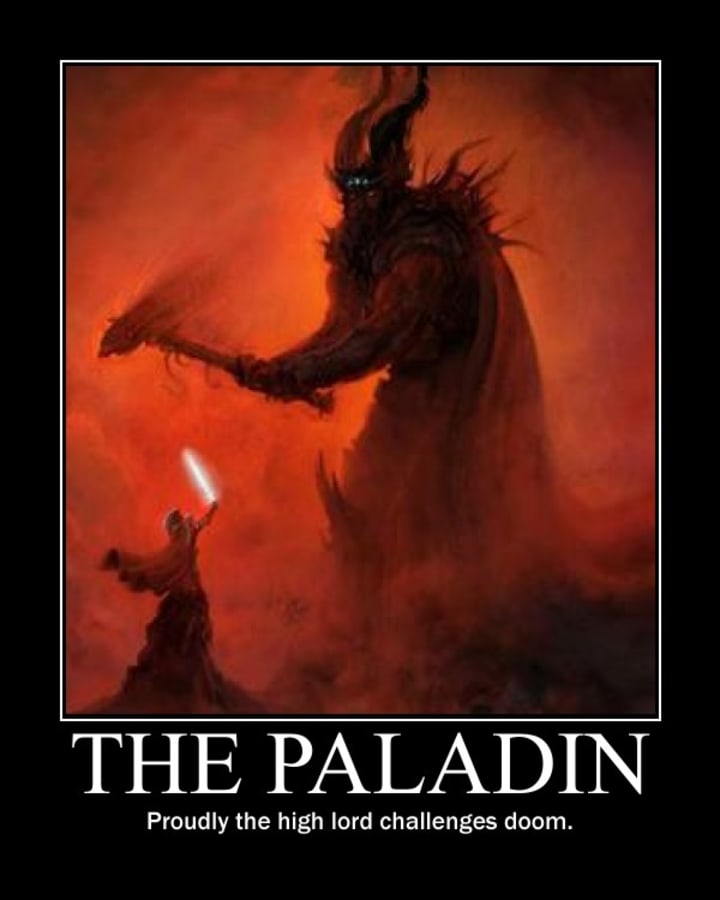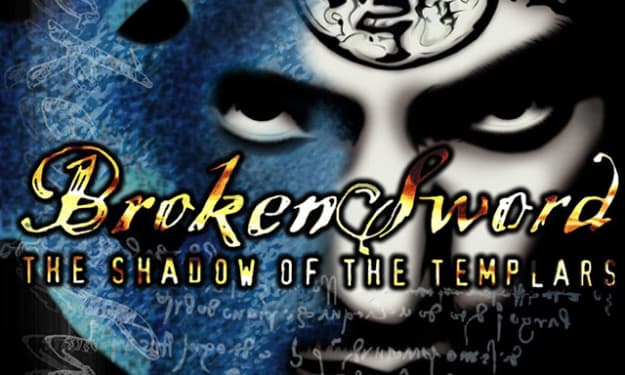3 Ways to Spice Up Combat in RPGs
A Short, But Effective, List

You spent weeks planning this confrontation. Squads of hobgoblins harried the party all the way up the mountain side, deathtraps lurked around every corner, and ancient curses tried to break their minds and spirits. They finally step into the ancient tomb of the lich lord, roll initiative... and just like that, the spell is broken, and you're back to business as usual. The tension, the drama, and the pulse-pounding excitement all leech out of the scene, hiding under the table until one side or the other emerges victorious from the run-of-the-mill slug fest your combat has become.
How did this happen? Well, combat is a lot like sex; you get out of it what you put into it, and if the tried-and-true isn't doing it for you, maybe it's time to change things up a bit.
Keeping that in mind, here are some ways you can put a kink into your player's expectations.
For more lists like this one, check out my 5 Tips archive!
#1: Bring 'Em Back Alive

Some men are easier to get into cuffs than others...
In a party made up of unscrupulous, homeless murderers of diverse races and employment histories, the strategy is usually to liberally apply evocation, greatswords, and crossbow quarrels until everything that's worth XP is lying in piles of its own viscera. But what do you do when that's not an option? When the party's victory, and indeed their paycheck, may rest on bringing their quarry back alive (if not necessarily in one piece)? In this situation the bandit leader, arcane warlord, or rampaging druid the party has come after is going to fight them as hard as possible, but the party has to win this encounter with one hand tied behind its back because they can't just out-and-out kill their target. Knowing you can't just pull out your deadliest tricks can necessitate some clever moves on your players' parts... but you need to let them know ahead of time so they can prep for it.
In other words, this is a great way to increase the challenge... but don't come up with a reason the party should take the villain alive ten seconds before you roll initiative. Let them choose the right spells, buy the proper alchemical items, things like that. Everyone should be having fun here.
#2: Stop The Ritual

Doesn't matter how many cultists you kill if they summon a dark god.
RPGs are stuffed full of cults, and nine times out of ten they're the hands behind the goblin raids, undead outbreaks, and/or marauding clans of raiders. And what do cults want? Well, usually it has something to do with virgins, fancy daggers, and opening a gateway to an outside realm to let in their masters.
The point isn't to kill the cult leader, fight the wicked champion, or smash the followers. Those are all options for the party to try, but the point of this combat is to stop the ritual the cult has begun.
This gives your players a lot of different options. Do they sabotage the ritual by sneaking up disguised as robed cultists to botch the wording? Do they use a non-lethal spell like silence in order to cut off the ritual so it can't be finished? Do they kill all the cultists? Destroy the altar? Steal the sacrifice? These are all options, but if you're going to go this route you need to be sure you don't pull a cheap trick like, “how much blood did you spill on the altar when you critted the high priest? Well, that should be enough to summon He Who Shall Not Be Named!”
Can you do that? Sure. But if you're going to do it, don't make it feel like you're taking away the players' victory, slapping them in the face with a trout, and then telling them to fight the Beast Lord of the Auto-Cthonic Depths because they stepped over a line in the sand they couldn't even see.
#3: This Place Is Coming Apart!

Surprisingly few dungeons are rated for earthquakes, oddly enough.
It doesn't matter how much purple prose you put into describing the fetid tomb, the sun-scorched plain, or the ancient vault where your fight is taking place; once the dice start flying, your players are going to get tunnel vision. That means that if your terrain has no mechanical effects on the PCs, they're going to ignore it.
That's where deteriorating terrain comes into the picture.
The party's disrupted the cult's evil spell, and now a volcano is erupting, there's an earthquake, the sky's raining fire... whatever Michael Bay effects make you happy. What will make your players sit up and pay attention is when the fluted columns start tumbling, the ceiling gives way, the floor falls into an abyss, or the whole damn place starts catching on fire. You've just raised the stakes, put a clock in the corner, and created a secondary threat. So, while your players might be able to slug it out toe-to-toe for 27 rounds, they need to take care of this in 5 or they're going to have much bigger problems than a Grave Knight with a grudge to settle.
Bonus Tip! Give Your Antagonists Personalities and Stories

One of the major mistakes that a lot of game masters make is that they just put mooks on the board with no names, faces, histories, or personalities. They don't have a background, special skills, unique knowledges, etc. to make them a part of this story, or to capture the players' imaginations at all.
Now, that doesn't mean every single NPC you put down needs to have sheafs of story about who they are, what they want, and why they're in a battle with the PCs, but they should be more than just a collection of numbers and bonuses. If you want your players to treat them like characters, then you have to actually make them characters.
To save a little time and effort on this task, you might want to check out the following supplements:
- 100 Random Bandits to Meet: If your party is going to be dealing with highwaymen of any stripe, this collection has a wide variety to choose from. Scouts, gang lords, and even a few notorious figures like the Maneater, or the Grimskull who are known for their gruesome habits and fearsome meins. For those who are running water-based campaigns 100 Pirates to Encounter might be more appropriate!
- 100 Prisoners For a Fantasy Jail: For the number of jail break campaigns out there, this is a supplement that can save GMs a lot of time and trouble. Whether your players are going to be in prison for just a single session, or a whole arc of the game, make sure they've got some interesting NPCs to interact with.
- 100 Random Mercenary Companies: The sheer number of bland, cookie cutter cutthroats that have showed up in games inspired me to write this collection. Useful for GMs as well as for players who want a more organic backstory! And if you want a more criminal-leaning version, then you should take a look at 100 Gangs For Your Urban Campaigns instead!
Things NOT To Do...
Chances are good that some of you got this far, and you're thinking, “Yeah, these are fun, but I don't really need to use cheap tricks like this. If I want to make things harder for my players, I can do that on my own.”
Let's talk about that word for a moment. Harder.
Your job as the DM isn't to make things hard. Your job is to make things challenging. They aren't the same thing. When players finish a hard session, they pack up their character sheets, go home, and silently hope that the game gets easier. When you finish a challenging session, your players go get late night milkshake and re-live all the awesome shit they pulled off.
If you're challenging your players, you're helping them shine. If you're just making it harder, you're punishing them.
Setting difficult tasks (rescue the hostage, stop the cult, collect all the dinguses) is a good way to challenge players. Randomly taking away PC abilities, giving your bad guys triple their normal hit points, or arming your villains with impossible-to-counter countermeasures are not challenging measures; they're just making things arbitrarily harder. No one slogs through a 15-round fight with an invisible sorcerer no one could find and says, “Wow, that was great.” No one scrapes through a fight where the DM randomly drops an anti-magic field and says, “You know, that was a really interesting experience having my only viable ability arbitrarily stripped away from me.” Lastly, no one finishes combat where the whole party threw rocks at the flying spellcaster and says, “That was a refreshing challenge.”
Does that mean you should never use these tactics? No, it doesn't. But if you're seeking out ways to specifically nullify everything the party can do just so your bad guy lasts longer, then maybe it's time to inject a different kind of challenge. Like minions! Everyone loves minions!
For more great gaming insights, check out Neal Litherland's blog Improved Initiative!
About the Creator
Neal Litherland
Neal Litherland is an author, freelance blogger, and RPG designer. A regular on the Chicago convention circuit, he works in a variety of genres.
Blog: Improved Initiative and The Literary Mercenary






Comments
There are no comments for this story
Be the first to respond and start the conversation.